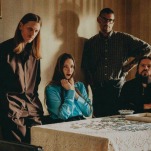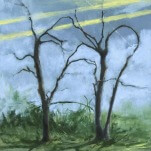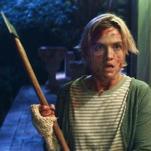Introducing Kathleen Carr Foster’s Epic Fantasy Debut, The Jewel of Corlivo
(Photo: Erewhon Books)
The world of fantasy publishing can often feel pretty daunting. There are so many titles that it can feel impossible to even keep track of everything that’s hitting shelves right now, let alone deals for new titles that we’re not going to see until next year. But every so often, you read about a forthcoming debt that just clicks, in a yes, that one’s for me kind of way. Erewhon Books has acquired Kathleen Carr Foster’s debut novel, The Jewel of Corlivo, at auction, in a two-book deal, for publication in 2026, and let’s just say it’s targeted like a laser at the specific sort of fantasy reader that loves epic stories with strong, complicated women at their centers. (Or, to put it another way, at me, specifically.)
The story follows a runaway courtesan’s pursuit of love, knowledge, and self-determination, and her journey from a mountain pleasure house to the imperial city, a hidden feminist enclave, and a long-lost library, set in a richly reimagined version of the Byzantine Empire. An as-yet-untitled second novel will follow.
Here’s how the publisher describes the story.
In Kathleen Carr Foster’s glittering debut set in a richly reimagined version of the Byzantine Empire, a runaway courtesan pursues an ancient treasure alongside her prickly suitor, only to find something much more valuable—herself.
Raised in Corlivo’s most luxurious house of pleasure, Anna has never had a choice about what her life will look like. She imagines it’ll be like her mother’s, who disappeared soon after she was born: working as a courtesan and drowning in debt. But then Anna comes across an old book that attracts the attention of Sebastianus, a gruff and surprisingly tender explorer who dreams of finding an ancient lost city of treasure.
Intrigued by Anna’s observations, Sebastianus offers her a tantalizing glimpse of the world beyond Corlivo; the two of them make their way from the mountain city to the bustling imperial capital, where Anna helps Sebastianus with his research and immerses herself in the marvels and dangers of life at court. But when she discovers a closely-kept secret tied to her mother’s past, Anna must flee the city and attempt to create a brighter future—not only for herself, but for all the women of Corlivo.
While we don’t know just yet when we can expect to see The Jewel of Corlivo hit shelves, we’ve got some juicy tidbits about its story to share. Paste had the chance to chat with Foster herself about her debut novel and find out a bit more about what to expect. And we’ve got an early excerpt from the story itself below.
![]()
Paste Magazine: Tell us a bit about The Jewel of Corlivo! What can readers expect from the story and what sets it apart from other fantasies on shelves right now?
Kathleen Carr Foster: The book was so much fun to write, and I hope it’s just as enjoyable for readers. It’s an alternate-history fantasy with a lush, literary feel, equal parts romance and adventure. It blends my favorite things: a slow-burn relationship, rich, imaginative, history-inspired world-building, and an exciting quest to find a lost treasure.
Anna is an apprentice courtesan, raised in a mountain city devoted to pleasure and luxury, who discovers a rare manuscript while searching for information about her own past. She ends up fleeing the city with a gruff but gentle explorer who has spent years on a search of his own. They set off together on an adventure that takes Anna first to the peril-filled capital city, then to a secret enclave for women trying to survive a dangerous system, and finally, to an unexpected place where only someone with Anna’s knowledge and experience could unearth a long-lost secret. If you love to be swept away on a romantic adventure involving old books, this is the tale for you!
Paste: Your story takes place in a reimagined version of the Byzantine Empire. What drew you to this period in history, and what did you want to make sure you kept from it in your version?
Foster: To me, one of the most remarkable things about this long period of history is how often it’s overlooked. Many of us have the perception that the Roman Empire simply came to an end when Rome fell to invaders in the 5th century. It’s easy to forget that the Eastern half of the Roman Empire, with Constantinople as its capital, thrived for another thousand years, bridging the ancient world and the late Middle Ages. Of course, the empire went through many changes during that millennium, but the idea that this was a continuous empire with one foot in the classical world and the other practically in the Renaissance fascinates me.
The book’s setting is inspired by the early Byzantine Empire and more specifically by the reign of the Emperor Justinian and his wife, Theodora. They were the 6th century’s power couple! It was a time when new religious ideas were taking hold, and the ideas of ancient Greek and Roman philosophers were falling out of favor. Justinian and Theodora were instituting many social changes, and there was a lot of unease about them. I wanted to bring to the book not only some of the art and politics of that time, but also the feel of a place in transition where the price of moving forward could be losing the wisdom of the past.
Paste: Introduce us to your heroine, Anna. Where did the inspiration for her character come from and what can you tell us about her journey?
Foster: Anna is clever and curious, but her life has been very limited. She’s been raised to be a courtesan in the glittering mountain city of Corlivo, a playground for the empire’s elite. Part of her journey is about trying to understand her world, which is suddenly expanding very quickly as the events of the story take place.
She feels things passionately, and she makes mistakes, but she tries to learn from them. Most importantly, she refuses to be defined by where she comes from. I have several amazing female friends like that—who absolutely will not let the circumstances of their past limit what their future looks like—and they are my inspiration for Anna.
Paste: Tell us about Anna and Sebastianus’s relationship; what kind of journey are they going on together?
Foster: Anna and Sebastianus start out with a significant power imbalance. She’s an apprentice courtesan, and he’s the wealthy nephew of the Emperor. In order for me to feel comfortable writing their story, part of their journey had to be about them rebalancing that relationship and finding a way to stand beside one another as equal partners.
Ultimately, they do that through the things that they share: a love of learning, a fierce desire for adventure, a sense of fairness, and a deep affection for their friends. They have to learn to trust each other, because the world they live in is dangerous. It will take the special things that each of them brings to the relationship to help them find what they’re looking for.
Paste: The Jewel of Corlivo is described as a feminist fantasy; can you tell us a little bit more about what that means for you?
Foster: Behind the fun and romance and adventure of this book is a core question: What kind of knowledge do we value? The scholarly writing of the ancient world is so closely associated with men: the authors, the historians, the stories that are recorded. What do we lose when women’s history is forgotten? What’s the cost of forgetting?
In this book, I wanted to explore what would happen if someone who understood and valued women’s knowledge and women’s labor had the courage to go looking for something buried deep in history.
Paste: What element of this book excited you the most while you were writing it? Do you have a particular moment (or character) from this story that you can’t wait for readers to experience?
Foster: I absolutely love the excerpt that we’re sharing here, because it gives the feel of both the beauty and menace of Corlivo.
I also adore the first long conversation Anna and Sebastianus have alone. They’re talking about an astrolabe, an ancient navigational instrument, and we see each of them having to rethink their initial impressions of the other. It was one of the earliest scenes I wrote, and it’s still one of my favorites.
The character of Klaudia, the first woman Anna has ever seen wearing a toga, came striding into my imagination just the way she strides into the first scene of the book. I think readers will enjoy meeting her. A couple of the moments I’m most excited about come toward the end of the book, as the mystery starts to unravel, so while I won’t spoil things by describing them here, I can’t wait for readers to encounter them!
Paste: Now that you’ve written your first book, what lessons are you going to take from that experience heading into your next one?
Foster: I’ve learned so much from having the chance to work with a thoughtful editor (and a wonderfully editorial agent). Some of the key lessons about pacing the action of a novel effectively and really digging deeper to build out the world and all the secondary characters are things I’m already applying as I begin work on my next book.
We’re especially thrilled that we can offer you a sneak peek at The Jewel of Corlivo right now. Enjoy!
![]()
The evening’s entertainment was on the terrace: a troupe of colorful acrobats and an animal handler with a pure white tiger, performing for the apprentice courtesans and, more importantly, for the guests who were there to make offers for us. Musicians played a cheerful tune on the kithara and bells.
Clemens Fabius emerged from the crowd of bidders and greeted me with a deep bow. His curly blond hair had been tamed by cream and was neatly parted in the middle of his head. In the torchlight, there was a faint blush on his freckled cheekbones. He was handsome, in a wiry, nervous way, and several of the other apprentices watched him with interest. Why had he singled me out tonight for conversation?
“Good evening, my dear girl,” he said. “Delightful to see you again.”
I curtseyed, but my eyes were on Sebastianus’s retreating figure. Every conversation I had with him left me feeling strangely unsettled.
“I’ve been thinking about your charming interest in exploring,” Clemens Fabius continued. “Shall we walk together?”
He held out his arm. I suddenly regretted sharing my interest in adventures outside the city. I had given him access to something too close to my heart, when instead I should be taking care to wall off those parts of myself. I should be keeping them far away from the men who came to buy our company.
But what could I do? I put my hand on his arm, and we set off at a slow pace.
He bent down to speak quietly in my ear. “I couldn’t help but notice that you were in conversation with the Archidux Sebastianus of Panpirion. I hate to speak ill of a fellow nobleman, but you’ve had so little exposure to the world that I feel I have some obligation.”
We stopped near the edge of the terrace. The moon was covered by a cloud, illuminating it with a pale-yellow glow. Far below us on the slope of the mountain the lights of the walled city twinkled.
“I don’t want to alarm you,” he continued, “but I understand you’ve already had a visit with him, so my warning is urgently needed.”
I rested my hand on the low stone wall and worked to sound indifferent. “An urgent warning? How mysterious.”
He continued as though I hadn’t spoken. “I’ve made a detailed inquiry about each apprentice here, of course. I want to be confident of a girl’s quality and innocence before I place a bid. I talked to the matron about you, and I’m disappointed to hear that the Archidux has already taken such an action, ahead of other bidders. It raises a question for me as to whether I should go forward.”
“My lord, we’re obligated to meet with any potential bidder who wants to have a private conversation.”
He took my hand in his slim, pale one. “I understand, but given his terrible reputation, I was quite surprised that the matron permitted it.”
Despite my own lack of worldliness, cloistered as I had been in the walled city my entire life, I could sense something naive, perhaps stubbornly so, about this man.
Clemens Fabius stared out over the city, lit up with a thousand candles and lanterns. “I must ask: did he encourage you to compromise yourself in any way?”
“Compromise myself?”
“Yes. Did he ask you to do anything that made you uncomfortable, that you weren’t prepared for?”
I thought of Geographica, the book I had taken from the library at Sebastianus’s request and hidden under my bed.
My expression must have revealed a thought, because he drew a quick breath. “Ah, I see he did.”
“No, I certainly don’t mean that he –”
He interrupted. “Tell me only this. Did you agree to his request? I need to know the truth, so I can decide in good conscience what to do.”
I knew we were not talking about the same thing, but as I had not yet actually given Sebastianus the stolen book, it was both truthful and less complicated just to say, “My lord, I have done nothing.”
He studied my face for a moment, and then his jaw relaxed. “I’m very much relieved to hear it. Shall we continue our stroll?”
We proceeded along the terrace.
“I must caution you to keep your distance from the Archidux,” he said.
“Why is that?”
He looked around, as though wanting to be sure no one was listening. “He’s capable of anything. It’s commonly understood that he murdered a fellow centurion during his time in the Imperator’s army and was dishonorably discharged.”
This news brought me up short. Sebastianus had murdered someone? He had been referred to as rough and unpredictable, but I hadn’t imagined him capable of that. I remembered our few conversations, how close behind me he had been standing mere minutes before, and my neck prickled again as though his breath were still there.
Clemens Fabius ran a hand through his curly hair. “Not only that, but he tossed aside an opportunity to enrich the Empire, when the Imperator’s war effort is in dire need of funds. Ah, but these broader issues are not the concern of a beautiful little flower such as yourself, safe within these walls. Now that my warning is given, let’s turn to more pleasant topics.”
We walked around the outer edge of the terrace. Vesta and the gem merchant were seated together at a small table. Vesta seemed so calm and determined, performing her assigned role with a composure that felt far beyond my ability.
A few feet away, Sebastianus appeared to be deep in conversation with another man, but I had the sense that the Archidux was always aware of what else was happening around him. At one point, our eyes met briefly before he turned back to his companion. A murderer? I could hardly believe it.
As we rounded another corner, making our way back toward our starting point near the performers, I realized Clemens Fabius was still in the middle of speaking.
“And that’s how I took command of the sailing vessel. I waved goodbye to my wife and daughters, and we were off. I was gone for four months that time, seeking new sources of silver ore. But that was hardly my longest voyage.”
“My, what a long journey.” What other secrets had Sebastianus withheld?
“Let’s take a closer look at this magnificent tiger,” Clemens Fabius said.
The creature was only a few yards away. The handler sat on an overturned box, and the tiger lapped at the ground with a pink tongue the size of pork loin.
Clemens Fabius drew me forward gently. “Don’t be afraid, my dear. I’ve encountered many of these creatures on my travels.”
The handler jumped to his feet, shaking his head. “No, my lord. No closer, please.”
Clemens ignored him. “I want this young lady to have a good look at the animal. I have some experience with these beasts. The thing is to approach with confidence. Stand aside.”
He took a few more steps forward, pulling me along until I could see each stiff, white whisker and the twitching of a moist grey nose the size of my fist.
The tiger stopped its grooming and lifted its head to look at us. Then it sprang to its feet and raised a massive paw.
What happened next took place so quickly that everything was a blur. The trainer shouted something, and the end of his whip soared through the air. The tiger roared and rose onto its hind legs, dwarfing the trainer, who brought the whip down with a crack! The animal struck, claws extended, and the man crumpled. Still balanced on its hind legs, the tiger let out a roar that seemed to shake the terrace. Suddenly there was woosh, like a rush of air past my ear, and the tiger collapsed with a heavy thud beside the fallen trainer. A silence settled over the terrace. Sebastianus stood a few feet away. His silver knife was embedded deep in the creature’s skull, the polished handle protruding from its eye socket. Someone behind me screamed.
I was rooted to the spot, trying to get my bearings. Shouting erupted all around me. The matron called for the medicus. A house servant dashed off in the direction of the infirmary. The tiger was slumped as though asleep. Despite the blood seeping through his white toga, the trainer seemed to be trying to reach the animal, his face a grimace of pain that might have been his own, or might have been grief for the beautiful creature.
Clemens Fabius was no longer at my side.
Sebastianus had retrieved his knife and was wiping it off with a cloth. He talked quietly with his tall, black-clad serving man, who had appeared at his side.
I noticed Kyra crossing the terrace unsteadily. She sat down quickly on a bench beside Comitissa Klaudia, who smiled and made room for her. I hurried over to join them, desperate for a place to rest my trembling legs.
Kyra looked pale and sweaty. Her eyelids were half-closed. “Anna, what happened? Are you all right?”
My heart pounded. “I hardly know what to say.”
The Comitissa said, more to herself than to either of us, “It will be all over the city by morning that Sebastianus killed that animal.”
“I think he might have been trying to help.” I remembered the rush of air past my ear and shivered. If he hadn’t acted so quickly, I might be lying there beside the animal trainer and the dead tiger. Would that rumor have caused as much interest?
Lacy Baugher Milas is the Books Editor at Paste Magazine, but loves nerding out about all sorts of pop culture. You can find her on Twitter and Bluesky at @LacyMB







































